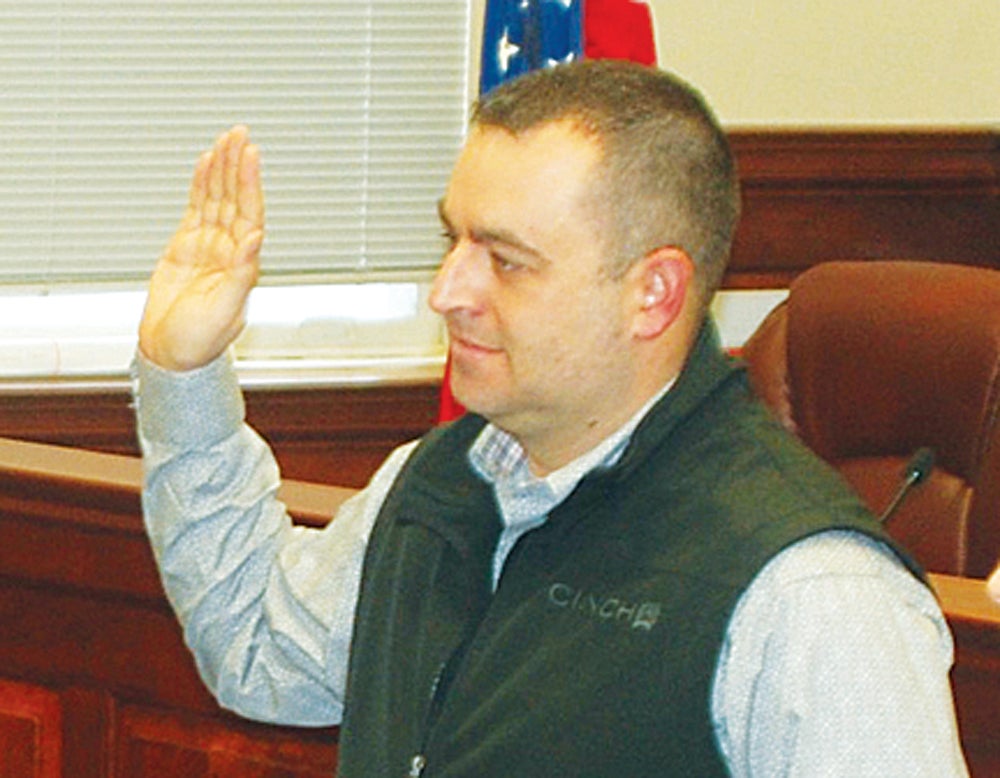Police officer, magistrate seeks decision on holding both positions
Published 10:38 am Wednesday, March 20, 2019

- Travis Thompson takes his oath of office in January 2019 after being elected magistrate. Thompson, who is employed as a Winchester Police officer, is seeking a ruling whether he can continue to serve in both roles. (Photo by Fred Petke)
Are being a city police officer and a county magistrate mutually exclusive under Kentucky’s constitution?
A petition was filed earlier this month in Clark Circuit Court for a judge to decide.
At the center of the issue is Travis Thompson, a recently re-hired and experienced Winchester Police officer and a newly-elected county magistrate.
Last week, Thompson filed a petition in Clark Circuit Court asking for a declaration from a judge to determine whether or not he can hold both offices.
The issue, according to attorneys and city officials, hinges on the required oaths of office for being a police officer and as magistrate.
According to the petition, Thompson was hired by the Winchester Police Department Sept. 3, 2018, and took his oath of office. Thompson was also running for the second district magistrate seat at the time, a position he ultimately won in the November 2018 general election.
Clark County Attorney William Elkins, though, has questioned whether anyone can serve simultaneously as a sworn officer and a sworn county magistrate, which could amount to holding a municipal office and a county office at the same time, which is prohibited under state law.
Winchester Mayor Ed Burtner said opinions were sought from the Kentucky Attorney General’s office, the Kentucky League of Cities and City Attorney Bill Dykeman. All agreed being a police officer and magistrate were not incompatible, he said.
Based on those opinions, the city decided to move ahead and re-hire Thompson, who previously was a city police officer for seven years.
A letter from Attorney General Andy Beshear’s office said previous opinions determined police officers were employees rather than holding a city office. A separate letter from KLC agreed the two positions are not incompatible, and that a city police officer, short of the police chief, is an employee and not an office holder.
“He doesn’t have an office with the city of Winchester,” Thompson’s attorney Brian Thomas said. “He holds a position with the city of Winchester.”
Both the attorney general’s office and the KLC suggested in their letters seeking a court ruling for a definitive answer.
“While this conclusion is this office’s interpretation of the law, we recognize that the existence of a common law incompatibility is, ultimately, a question for the courts to decide,” wrote Assistant Attorney General Taylor Payne in a Jan. 3 letter to Thomas, who was the elected Clark County Attorney at the time. Thomas now represents Thompson as a private attorney.
Winchester City Attorney Bill Dykeman said he is preparing a response which will concur with the attorney general and KLC letters.
Thompson, Thomas, Burtner and Winchester City Manager Matt Belcher said they all want the same thing: a yes or no answer.
Thompson said he had no issue with the city and Belcher characterized the petition as a “friendly lawsuit.”
“The city has stood behind me 100 percent,” Thompson said.
“We’re asking them to make a determination whether he can hold both,” Thomas said. “We believe on the attorney general’s opinion that he can.”
Clark County Attorney William Elkins disagrees, saying Thompson voided his oath as a police officer when he took the oath of office to become a magistrate. The oath is required of all police officers in Kentucky, though it is not an elected office.
“In Kentucky, officials are prohibited from holding two public offices, both by Kentucky constitution and Kentucky statute,” Elkins said. “…If you swear an oath to an office and take a subsequent oath to a second office, you vacate the first oath.”
Elkins said it raises the question concerning the police officer’s arrest powers, if the oath is indeed void, as well as any previous arrests. Elkins said he dismissed six of Thompson’s cases and continued others until June to allow Thompson to either file complaints or provide a “legally binding opinion” that he can be a police officer and magistrate concurrently. The letters submitted by KLC and the attorney general’s office, he said, are not legally binding.
The same issue would exist if a deputy sheriff, for example, was elected to the city commission, Elkins said.
Elkins, who said he raised the issue with the city, said there could be serious issues with an unauthorized officer making arrests.
“I wrote to Travis Thompson through his superiors on Feb. 26 and asked them not to allow Thompson to involve my office in any further prosecutions,” Elkins said, “without first obtaining a judge’s opinion that he was authorized to exercise the duties of a police officer.”
Thompson said he was placed on desk duty within the police department March 4.
City employees have served as elected county officials before, most recently Matt Brinegar who was a city firefighter as well as a county magistrate. Brinegar resigned as magistrate when he retired from the fire department in December 2016 because of a conflict between his fire department and magisterial retirements.
Firefighters, Burtner said, are not required to take an oath of office, though.
Thomas said the oath of office for police officer is different from the general oath, as it adds that the person will “faithfully discharge the duties of his or her office.” The general oath says “… that I will faithfully execute, to the best of my ability, the office of … according to law.”






